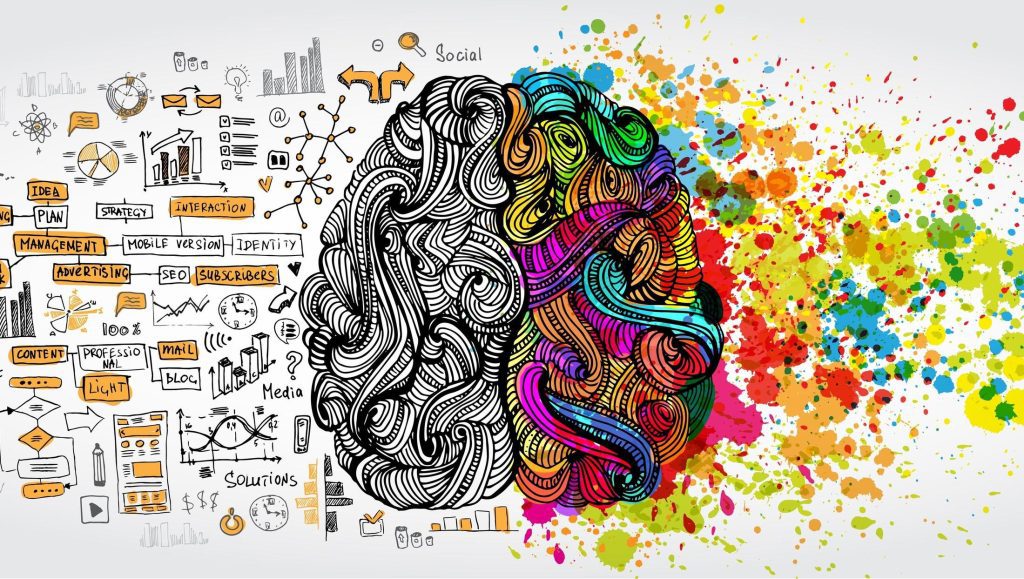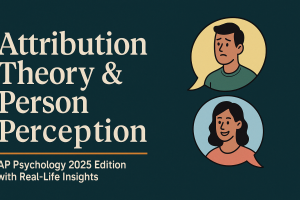Overview of AP Psychology
Hey there! 

What is AP Psychology?
AP Psychology is designed to give you a comprehensive introduction to the scientific study of behavior and mental processes. It’s equivalent to a semester-long introductory psychology course you might take in college. Here’s what you’ll cover:
- Understanding the Mind and Behavior: Explore various psychological theories and concepts.
- Research Methods: Learn how psychological research is conducted and analyzed.
- Applications of Psychology: Study how psychological principles apply to everyday life and various professional fields.
There are nine units in AP Psych, each focusing on different aspects of psychology, all of which require zero prerequisites 
Key Features of AP Psychology:
- Memorization: The course involves a lot of memorization, especially of key terms and theories.
- Visual Learning: Many concepts can be visualized and graphed, which is great if you’re a visual learner
.
- Engaging Content: The material is often interesting and relevant to real-life situations, making the course enjoyable for many students.
Format of the AP Psychology Exam
Understanding the exam format is crucial for effective preparation. Here’s a breakdown:
Multiple-Choice Section
- Duration: 70 minutes
- Questions: 100 multiple-choice questions
- Weight: 67% of the total exam score
- Focus: Tests your understanding of psychological concepts, theories, and research methods.
Free-Response Section
- Duration: 50 minutes
- Questions: 2 free-response questions
- Weight: 33% of the total exam score
- Focus: Assesses your ability to apply psychological knowledge to real-life scenarios and analyze psychological phenomena.
Preparation Tips:
- Concept Mastery: Ensure you have a solid grasp of all the units.
- Practice Exams: Familiarize yourself with the exam structure by taking practice tests.
- Time Management: Develop strategies to allocate your time effectively during the exam.
How Hard is AP Psychology?
AP Psychology is often regarded as easier than the average AP course, but individual experiences may vary. Let’s look at some data and factors that influence its difficulty.
Data and Statistics 
According to the College Board:
- 20.5% of students scored a 5 in 2019
- 64.5% of students passed the exam with a score of 3 or higher
These statistics suggest that AP Psych is accessible to a wide range of students, especially those who engage with the material actively.
Factors to Consider 
Workload
The amount of time you spend on AP Psych can vary based on your teacher and personal study habits. Here are two main approaches:
- Consistent Study:
- Pros: Helps retain information over time, reduces last-minute cramming.
- How: Read a few pages daily, take detailed notes, and create outlines.
- Cramming:
- Pros: Intensive focus can be effective if you learn quickly.
- How: Study vocabulary and key concepts a few days before exams using tools like Quizlet.
Motivation
Your level of motivation significantly impacts your success in AP Psych. Here are ways to stay motivated:
- Set Goals: Define clear academic goals and celebrate small achievements
.
- Find Relevance: Connect psychological concepts to real-life situations to make learning more interesting.
- Stay Organized: Keep track of assignments and study schedules to manage your time effectively
.
Time Commitment
AP Psychology is manageable with the right approach:
- Balanced Effort: Allocate specific times for studying and stick to a routine.
- Efficient Learning: Focus on understanding concepts rather than rote memorization.
Is AP Psychology Worth Taking?
Absolutely! AP Psychology offers numerous benefits that extend beyond just earning college credit. Here’s why it’s worth considering:
Benefits of Taking AP Psychology
- Academic Credit
:
- High scores can earn you college credit, potentially saving time and tuition costs.
- Foundation for Future Studies:
- Provides a solid base for advanced psychology courses and related fields like sociology, education, and human resources.
- Enhanced Critical Thinking:
- Develops analytical skills by evaluating psychological theories and research methods.
- Real-Life Applications:
- Understanding psychology can improve your personal relationships, communication skills, and self-awareness.
- Informed Citizenship:
- Equips you with knowledge about human behavior, which is valuable in diverse aspects of society and workplaces.
Considerations Before Enrolling
- Interest in Psychology:
- If you’re fascinated by how the mind works and enjoy learning about human behavior, AP Psych is a perfect fit
.
- If you’re fascinated by how the mind works and enjoy learning about human behavior, AP Psych is a perfect fit
- First AP Course:
- AP Psych is an excellent choice for your first AP course, offering a manageable workload while introducing you to the rigor of AP exams.
- Career Aspirations:
- Beneficial for careers in psychology, counseling, education, business, and more.
Student Experiences
Many students who have taken AP Psychology find it fun, interesting, and engaging. However, success largely depends on your dedication and study habits. Here’s what some students have to say:
Quotes from Students Who Took AP Psychology
“AP Psychology was truly insightful as it opened the door to secrets about me that I hadn’t yet discovered, teaching me how my mind works and thinks. The course allowed me to understand why certain parts of my brain and body functioned in various ways. I was fascinated!” — Meghna P.
“AP Psych, by all means, was worth it! Personally, what I loved most about it was that everything we learned was so directly applicable to real life.” — Mishika G.
“AP Psych was more than worth it. It had a unique curriculum that incorporated science, history, and language all in one. I usually forget content after taking the test, but the information I learned in AP Psych has truly stuck with me.” — Lillian M.
“AP Psych is not related to my major, but it taught me so much about culture, how people behave/interact, and how to communicate well with others. It taught me people skills, how to have a good school-work-life balance, proper eating/sleeping/studying habits (seriously. there’s a whole module dedicated to this, and it’s so helpful) and cultural differences!” — Colleen B.
Study Tips for AP Psychology
To excel in AP Psychology, effective study strategies are essential. Here are some tips to help you succeed:
1. Understand the Basics
- Foundational Concepts: Grasp fundamental psychological theories and terminology.
- Key Units: Focus on the nine AP Psych units, ensuring a thorough understanding of each.
2. Stay Organized
- Notes and Outlines: Keep detailed notes and create outlines for each unit.
- Flashcards: Use flashcards for memorizing key terms and concepts.
3. Apply Real-World Examples
- Practical Applications: Relate psychological theories to real-life situations to enhance comprehension.
- Case Studies: Analyze case studies to see how concepts are applied in various contexts.
4. Practice with Past Exams
- Multiple-Choice Questions: Regularly practice MCQs to familiarize yourself with the exam format.
- Free-Response Questions: Practice writing FRQs to develop your analytical and writing skills.
5. Utilize Online Resources
- Khan Academy: Offers free lessons and practice questions on AP Psych topics.
- Quizlet: Great for creating and studying flashcards.
- College Board: Provides official AP Psych resources and practice exams.
6. Join Study Groups
- Collaborative Learning: Discussing topics with peers can deepen your understanding and provide different perspectives.
- Teaching Others: Explaining concepts to others reinforces your own knowledge.
7. Consistent Review
- Regular Study Sessions: Avoid cramming by studying consistently throughout the year.
- Summarize Key Points: Periodically review summaries of each unit to retain information.
Conclusion
AP Psychology is a valuable course that offers more than just an introduction to psychological principles. It equips students with critical thinking and analytical skills, fosters a deeper understanding of human behavior, and prepares them for future academic and professional endeavors. While it may present new challenges, especially for those unfamiliar with psychological concepts, the structured curriculum and engaging content make it an achievable and rewarding endeavor.
Taking AP Psych not only enhances your academic profile but also provides practical knowledge applicable in various aspects of life, from personal relationships to informed citizenship. If you’re curious about the intricacies of the human mind and behavior, AP Psychology is certainly worth taking.
You got this!
Frequently Asked Questions (FAQs)
1. Is AP Psychology Hard?
AP Psychology is generally considered easier than the average AP course, with many students finding it manageable and enjoyable. While it involves a significant amount of memorization and understanding of psychological concepts, the course’s structured nature and engaging content make it accessible. Success in AP Psych depends on consistent study habits, active engagement with the material, and effective exam preparation.
2. What Topics Are Covered in AP Psychology?
AP Psychology covers a wide range of topics, organized into nine units:
- Scientific Foundations of Psychology: Research methods, statistics, and ethics.
- Biological Bases of Behavior: Neuroscience, brain structures, and genetics.
- Sensation and Perception: How we process sensory information.
- Learning: Classical conditioning, operant conditioning, and observational learning.
- Cognition: Memory, intelligence, and problem-solving.
- Developmental Psychology: Human development from infancy to adulthood.
- Motivation and Emotion: Theories of motivation and emotional processes.
- Personality: Personality theories and assessment.
- Testing and Individual Differences: Psychological testing, intelligence, and mental disorders.
3. Can AP Psychology Help Me in My Future Career?
Absolutely! AP Psychology provides foundational knowledge beneficial in various fields, including:
- Mental Health: Careers in counseling, therapy, and psychology.
- Education: Teaching, educational psychology, and academic administration.
- Business: Human resources, marketing, and organizational behavior.
- Healthcare: Nursing, medicine, and public health.
- Social Services: Social work, community outreach, and nonprofit management.
Additionally, the analytical and critical thinking skills developed in AP Psych are valuable in any career path.
4. Do I Need to Have Taken Psychology Before Taking AP Psychology?
No prior experience with psychology is required for AP Psychology. The course is designed to introduce students to the field from the ground up, starting with basic concepts and gradually building to more complex topics. Whether you’re new to psychology or have some background knowledge, AP Psych accommodates all levels of familiarity.
5. How Can I Prepare for the AP Psychology Exam?
Effective preparation strategies include:
- Consistent Study Schedule: Dedicate regular time each week to study and review material.
- Utilize Practice Exams: Take practice tests to familiarize yourself with the exam format and identify areas for improvement.
- Engage with Interactive Resources: Use online platforms like Khan Academy and Quizlet for additional practice and reinforcement.
- Join Study Groups: Collaborate with peers to discuss and review key concepts.
- Focus on Understanding: Strive to understand the underlying principles rather than just memorizing facts.
References and Further Reading
- College Board AP Psychology Course Description: College Board AP Psychology
- Khan Academy – AP Psychology: Khan Academy AP Psychology
- “Psychology” by David G. Myers: A comprehensive textbook covering all AP Psych units.
- Investopedia – AP Psychology Overview: Investopedia AP Psychology
- AP Classroom Resources: AP Classroom
- “The Principles of Psychology” by William James: Foundational text in psychology studies.
- Quizlet – AP Psychology Flashcards: Quizlet AP Psychology
- American Psychological Association (APA): APA Psychology Topics
- “Thinking, Fast and Slow” by Daniel Kahneman: Explores cognitive psychology and decision-making.
- Reddit – r/APStudents Community: Reddit AP Students










